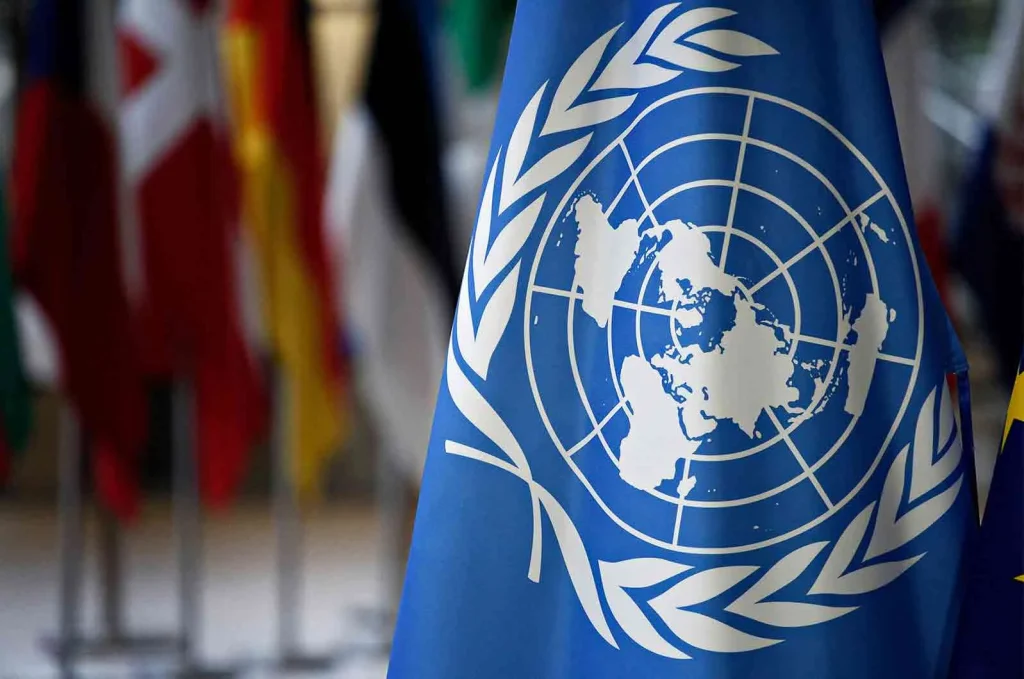
The United Nations marks its 80th anniversary this year, at a time and in a world that are remarkably different from those it was born into – and yet which also bear some striking similarities.
Officially entering into existence on 24 October 1945, less than two months after the end of World War Two, the UN set out its aims in its Charter, including to “maintain international peace and security”, “reaffirm faith in fundamental human rights”, “promote social progress and better standards of life” and ensure “justice and respect for the obligations arising from treaties and other sources of international law”.
It initially had 51 members and now has 193, and like its membership its mission has also slowly expanded, evolving into areas such creating the Sustainable Development Goals (SDGs) and supporting financing for development purposes.
Secretary-General António Guterres (whose term ends in December 2026) now wants the UN to review its role and its remit and has used the opportunity of its landmark anniversary to launch the UN80 Initiative, “a system-wide push to streamline operations, sharpen impact, and reaffirm the UN’s relevance for a rapidly changing world”.
While the principles the UN was founded upon remain vital – especially at a time of conflicts in Ukraine, Sudan, Gaza, the Democratic Republic of Congo and elsewhere – they are also facing some of their biggest tests since the organization came into being.
“This is a good time to take a look at ourselves [to] see how fit for purpose we are in a set of circumstances which, let’s be honest, are quite challenging for multilateralism and for the UN,” says UN80 Task Force Chair Guy Ryder.
The UN80 process will involve three tracks of reform. The first will aim to improve internal efficiency and effectiveness through “cutting red tape and optimizing the UN’s global footprint by relocating some functions to lower-cost duty stations”.
The second will examine the thousands of mandate documents that dictate what the UN does in order to remove those that have become outdated and “prioritise and de-prioritise” the organization’s aims and work.
The third will look at whether “structural changes and programme realignment are needed across the UN System” to simplify operations.
With the UN’s budget under pressure from governments withholding contributions and cutting foreign aid, some have claimed UN80 is a cost-saving exercise.
The UN itself has described its financial pressures as “undeniable” and has said that the cuts are felt most acutely around the numerous lifesaving aid programmes that are at risk due to budget shortfalls. Such programmes include HIV/AIDS work in Tajikistan and protection for women and girls in crisis zones such as DRC, Sudan, Haiti and Afghanistan.
But Ryder says UN80 is not about cost-cutting or downsizing, and the organization has billed the initiative as “reform, not retrenchment”.

“UN80 wants to improve the impact and effect of multilateralism and the UN,” Ryder says. “That does not mean … that we do not have to take a look at our budget and our resources in different parts of the system. If the UN is able to transform itself, to make improvements, sometimes through difficult decisions, that can mean those life-saving interventions reach the people we serve more effectively.”
The UN has repeatedly proven its ability to fulfil its mandate, from securing the Treaty on the Non-Proliferation of Nuclear Weapons to eradicating smallpox through the work of the World Health Organization (WHO) and creating UNICEF, which has helped millions of children receive everything from vaccinations to sanitation.
Even in the challenging context of recent years, the UN has continued proving its ability to strike major accords to help solve the world’s biggest problems. This year alone it has brought into being the Compromiso de Sevilla (a renewed global framework for financing sustainable development) and, through the WHO, the Pandemic Agreement, which will improve how the world prepares for and responds to outbreaks such as Covid-19.
Furthermore, while the UN’s current security architecture has been criticised given the proliferation of conflicts today, it is precisely these situations that make the UN’s peacekeeping and mediation efforts just as important in today’s world as they were 80 years ago.
The UN80 Initiative calls for the reform process to be “inclusive and transparent”, having highlighted young and marginalized voices as being crucial to securing peace and security.
Inclusion will be critical to securing progress on the SDGs, too. A more inclusive UN that reflects the voices, needs and priorities of member states and other stakeholders strengthens legitimacy and trust, making its decisions and actions more representative and sustainable.
These reforms will form just one part of a broader reimagination of international cooperation that the UN recognizes is needed in the face of today’s pressures on multilateralism and the traditional humanitarian aid system. The World Economic Forum is working to support this agenda through the Global Future Council on Reimagining Aid and by creating a space for dialogue on the future of multilateralism.
“If we take the view that multilateralism is the best instrument we have for meeting global challenges, then we need to make sure we renovate, refresh, and make that machinery as effective and as fit for purpose as it can possibly be,” Ryder says. “We will come out of this with a stronger, fit-for-purpose UN, ready for the challenges the future will undoubtedly bring us.”
Source: World Economic Forum